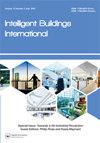用户交互个性化全光管理
IF 1.7
Q2 CONSTRUCTION & BUILDING TECHNOLOGY
引用次数: 1
摘要
摘要尽管办公楼的自动照明控制有潜在的节能潜力,但由于可用性差,研究结果显示其性能令人失望。为了探索有可能提高用户对这些系统满意度的解决方案,进行了以用户为中心的迭代设计,以提出个性化的系统行为和易于使用的用户界面(UI),用于全光管理(TLM)。这些步骤包括定义半自动系统行为,该行为从用户与系统的交互中隐式地导出用户照明偏好。在一次专家审查中评估了四种控制方案。根据收到的反馈,重新设计的UI随后在绿野仙踪研究中作为TLM系统的一部分进行了评估。结果表明,提供照明调光水平和百叶窗位置的直接控制的UI比具有间接控制的UI提供了更高的可用性水平,在间接控制中,用户通过人工照明和日光的组合来定义所需的照度。本文章由计算机程序翻译,如有差异,请以英文原文为准。
User interaction for personalized total light management
ABSTRACT Despite the potential energy savings of automatic lighting control in office buildings, findings show disappointing performance due to poor usability. To explore solutions with a potential to improve user satisfaction with these systems, an iterative user-centered design was done to propose personalized system behavior and an easy-to-use user interface (UI) for total light management (TLM). The steps included defining the semi-automatic system behavior that implicitly derives user lighting preferences from user interaction with the system. Four control options were evaluated in an expert review. Based on the received feedback a redesigned UI was subsequently evaluated as part of the TLM system in a Wizard-of-Oz study. The results showed that the UI offering direct control of lighting dimming level and the position of the blinds offered higher level of usability than the UI with indirect control in which a user defines the desired illuminance from a combination of artificial lighting and daylight.
求助全文
通过发布文献求助,成功后即可免费获取论文全文。
去求助
来源期刊

Intelligent Buildings International
CONSTRUCTION & BUILDING TECHNOLOGY-
CiteScore
4.60
自引率
4.30%
发文量
8
 求助内容:
求助内容: 应助结果提醒方式:
应助结果提醒方式:


